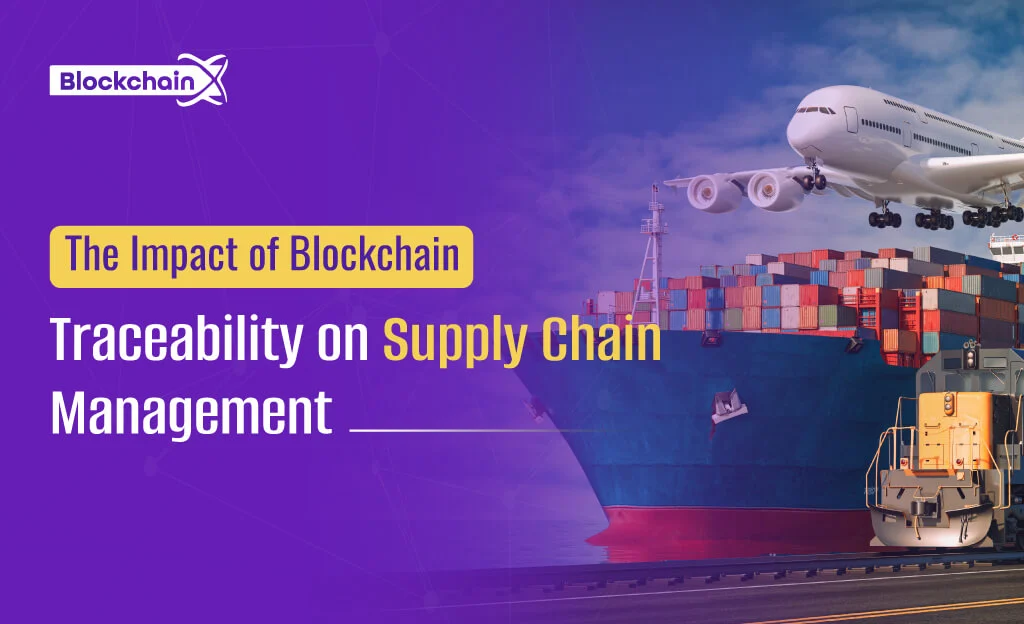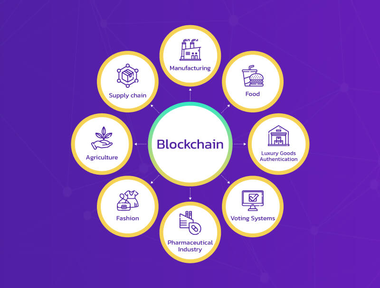Table of Contents


A Comprehensive Guide to Blockchain in Supply Chain Management
Recently blockchain technology has revolutionized various industries. One area that has captured most of the attention is supply chain management.
Through promising solutions for blockchain in supply chain it proved its importance. This led to focus on blockchain traceability drawing interest and driving discussions about its potential benefits.
Despite the hype over blockchain in supply chain for traceability is high it's important to acknowledge the same for the momentum it has developed over its existence. It eventually did not give up on new evolutions who are encouraging new use cases and striving to build things better. To provide a better understanding of traceability in blockchain here is a detailed overview of its technical foundations. Also explore the potential applications in supply chain management and the benefit it can offer to the organizations operating are discussed in here.
These aspects can give much more clarity and expand the potential of Blockchain in Supply chain.
What is Blockchain In Supply Chain Management?
Traceability in blockchain technology is commonly discussed within the context of supply chain management. It adds potential value in the field of supply chain with traceability being the key advantages. This combined ability to program business logic using smart contracts blockchain has the potential to enhance traceability in a more effective manner.
Blockchain technology provides enhanced transparency regarding the origin and journey of consumer goods improving our understanding of their provenance. It refers to the complete chain of custody from the product's point of origin to its consumption. Additionally blockchain enhances the accuracy of asset tracking throughout the supply chain improving efficiency. In the existing technologically advanced world the integration of blockchain in supply chain management has the potential to increase overall efficiency. Moreover blockchain enables auditable tracking of assets and helps prevent exploitative practices ensuring accountability and integrity in the supply chain.
Why is Supply Chain Traceability important?
There are various reasons why supply chain traceability is vital. It helps organizations manage risk by increasing visibility. Blockchain in supply chain assists businesses in ensuring that their products are manufactured in a safe, ethical and sustainable manner which can increase customer trust and brand reputation. It can also assist businesses in reducing waste, increasing efficiency and improving their sustainability efforts.
Motivating Benefits of Supply Chain Traceability
The following are some of the benefits of blockchain in supply chain traceability:
The visibility over the movement is made transparent and accessible in the supply chain for all.
Through blockchain traceability the system inherits the ability to manage risk effectively.
Enhanced attempts to achieve sustainability through efficient utilization of resources.
There is a solid count witnessed in Waste reduction
Increased efficiency in term of internal operations and user persona
Blockchain in supply chain traceability has ensured to hold on to gain Customer trust and brand reputation which has prominent improved with the integration.
The Challenges of Supply Chain Traceability
While supply chain traceability supported with Blockchain has many benefits, implementing it can be difficult. Among the most difficult challenges are:
Limited visibility into supplier networks
Data collection and analysis are difficult.
Lack of standardized data formats.
High implementation costs for new technology and tools
How does Blockchain achieve product traceability?
Global Blockchain in supply chain fraternity play a crucial role in facilitating the movement of various assets, including consumer packaged goods. However, supply chains also face challenges such as product recalls, which occur when certain consumer products or raw materials need to be withdrawn from the market to prevent harm or injury. Product recalls have significant negative consequences worldwide, leading to lawsuits, lost sales, and replacement costs. When discussing traceability in blockchain, the focus lies on utilizing blockchain technology to streamline product recalls while also reducing counterfeiting.


How is the underlying technological concept of traceability in blockchain evolving?
Blockchain is essentially a 'chain of blocks, in which each block represents a collection of various transactions along with transaction timestamps and participant information. A cryptographic hash function is used to add each block to the existing chain of blocks. If you need to access the data in a block you must first obtain the keys for decrypting the hash function. With the data the block can provide precise information and helps in doing a thorough audit that contributes in recording various milestones a product has passed on by integrating blockchain in supply chain traceability.
Use Cases of Blockchain Traceability in Supply Chain
To fully understand the impact of blockchain in supply chain, it is essential to explore real time applications of traceability. Blockchain has the potential to enable traceability in multiple sectors and eventually adopt blockchain. Traceability finds clarity within the supply chain domain that improves product tracking across complex supply chain networks. Now let's dive into specific examples demonstrating the diverse use case of traceability across various networks.
Supply chain
The advantages of employing blockchain traceability supply chain are more. Particularly the decentralized nature of blockchain technology when integrated in the supply chain enables secured transparent transactions. and improves efficiency. Blockchain immutability plays a vital role in ensuring the integrity of goods' provided within the supply chain. Furthermore, utilizing blockchain-based traceability improves the challenges associated with reconciling data among multiple parties. Real-time visibility provided by blockchain in supply chain offers additional benefits of enabling track-and-trace analysis operations.
Agriculture
Blockchain traceability has proven to be effective in addressing various challenges in the agriculture sector. It offers solutions for enhancing crop production efficiency and streamlining agricultural finance management. By combining blockchain in supply chain technology with IoT sensors traceability in agriculture can be achieved by monitoring crop fields. The data collected from parameters such as soil moisture, temperature, light, humidity, and pH can be securely documented on the blockchain. Additionally, the integration of machine learning algorithms and predictive models empowers farmers to make informed decisions about agricultural practices. Furthermore it enables the sharing of information among farmers and stakeholders at each step of the food production process. This transparency facilitates effective audits conducted by auditors ensuring accountability and trust in the agricultural supply chain.
Fashion
Every year, the burden of counterfeit goods costs the fashion sector a lot of money in terms of annual sales. At the same time fashion brands are losing market trust. As a result blockchain could help in monitoring the supply chain of goods in order to build a stronger basis of trust for customers. Blockchain in supply chain for fashion could ensure that customers know where their fashion products come from. Furthermore one possible benefit of traceability is the use of unique identifiers to confirm the uniqueness of commodities. The unique identity might assist you in determining where the product has been along the value chain.
Pharmaceutical Industry
Blockchain in supply chain can also address the issue of counterfeit drugs in the pharmaceutical industry. This is done by recording the entire supply chain history of medications on a blockchain. It becomes possible to verify the authenticity of drugs prevent altering for duplicates and ensure proper handling and storage conditions.
Voting Systems
Blockchain traceability enhance the integrity and transparency of voting systems. By recording each vote on a blockchain, it becomes virtually impossible to alter or manipulate the results. It provides a secure and audit-able voting process promoting trust and confidence in democratic systems.
Luxury Goods Authentication
Blockchain traceability can be employed to authenticate luxury goods such as high-end watches, jewellery, and artwork. It allows consumers and collectors to verify the originality, ownership, and authenticity of valuable items, reducing the risk of fraud.
Food
Consumers' expectation on food and its quality is constantly changing over time. The demand to know the source of the food is also high. Through blockchain these are met. The users/consumers can know the origin of the food items through traceability. It also give more insights on the produces understand future requirements based on the current supply. Blockchain in supply chain traceability brings more transparency on the produces while this helps both customers and producers to be quite aware of their actions.
Manufacturing
Manufacturing companies might use blockchain to facilitate data interchange with greater accuracy and security across complex supply networks. Traceability in blockchain technology could provide access to a permanent digital record of materials, chemicals, parts, and other items in the manufacturing sector. Thus it can ensure a rapid increase in the visibility of the production process from beginning to end. At the same time, everyone involved in the production process could rely on a single source of trust. Most crucially it could aid companies in increasing blockchain in supply chain traceability. For example, the use of IoT and blockchain could aid in the collection of product data such as temperature, pH, moisture, and other factors at various locations along the supply chain.
Is Blockchain the Key to Next-Generation Traceability?
The development of trust is a significant challenge in today's world particularly when it comes to addressing traceability concerns in various supply chain oriented industries. Meeting these challenges can be difficult and complex. The consumer's expectations are eventually constantly evolving as they want affordable and readily available products, and need to know about the product origin, validity, and quality.
Therefore, next-generation traceability must prioritize continuous monitoring, complete visibility, and transparency, along with improved efficiency and flexibility in designing the logistics processes.
In this context blockchain in supply chain emerges as an important solution to solve the challenges in traceability. By vesting on blockchain technology, a detailed audit trail can be established for assets as digital threads. Smart contracts and automation improve the traceability process efficiently, ensure transparency and accuracy in recording the transactions and validates them.
To Conclude
Blockchain traceability integration takes the ownership to revolutionize supply chain management. As companies entrust themselves to navigate complex global networks the adoption of blockchain technology is empowering. They establish trust drive efficiency and mitigate risks within their supply chains. Blockchain in supply chain, is an innovation that helps businesses to pave the way for a transparent, secure, and resilient ecosystem for the future.





